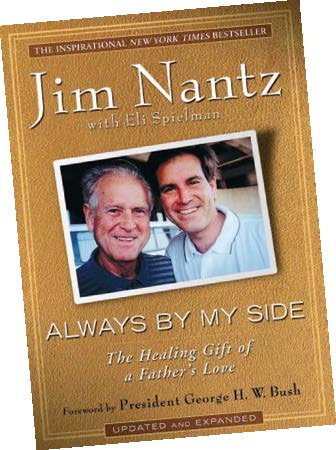
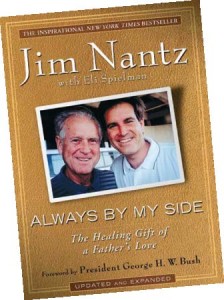 You may not recognize his face, but if you’re a sports fan, you’ll likely recognize his voice. Jim Nantz, a sports commentator for CBS for almost 30 years, calls some of the biggest events in sports. From the Super Bowl to the Masters to the NCAA Final Four Men’s Basketball Championship, Nantz has covered it all. He is a two-time Emmy award winner and a five-time National Sportscaster of the Year recipient. He’s also the son of a parent who was afflicted with Alzheimer’s. His father, Jim Nantz II (this Jim is the third), had Alzheimer’s for 13 years before passing. We talked with Jim about his father’s illness and why he’s made it a mission to raise awareness and help defeat Alzheimer’s.
You may not recognize his face, but if you’re a sports fan, you’ll likely recognize his voice. Jim Nantz, a sports commentator for CBS for almost 30 years, calls some of the biggest events in sports. From the Super Bowl to the Masters to the NCAA Final Four Men’s Basketball Championship, Nantz has covered it all. He is a two-time Emmy award winner and a five-time National Sportscaster of the Year recipient. He’s also the son of a parent who was afflicted with Alzheimer’s. His father, Jim Nantz II (this Jim is the third), had Alzheimer’s for 13 years before passing. We talked with Jim about his father’s illness and why he’s made it a mission to raise awareness and help defeat Alzheimer’s.
Preserving Your Memory: Tell me about your dad’s first experience with Alzheimer’s.
Jim Nantz: That really comes down to a single day in May of 1995. I was covering a golf tournament in Fort Worth, Texas. My dad was tagging along for the weekend, which was something we did quite often and I loved having him be a part of it. My dad had been out watching some of the action by foot. He came back to my tower just before we were going on air. He appeared very overheated and stressed. I knew something was amiss. I encouraged him to go into the clubhouse and cool off. He walked down the stairs of my tower and we began our broadcast live. Little did I know, my dad collapsed at the base of the tower and was taken to a local hospital. It turns out he had suffered a mini-stroke. That became really the trigger point, if you will, where life was never going to be the same for him again.
PYM: Did he have any issues with his memory before then?
JN: The reality is there were some moments of confusion for him for perhaps two years prior. He never lost his keys or anything, but at times, he had an inability to get people’s names out correctly. He would mix their first name with their last name. We of course were clueless that this was actually a medical condition and one day my dad would be suffering from Alzheimer’s. We just thought it was an absent-minded moment when occasionally he’d get a name upside down. We laughed it off, he laughed along with us, and it was life back to normal, or so we thought.
PYM: How did the Alzheimer’s diagnosis come about, and what was your initial reaction?
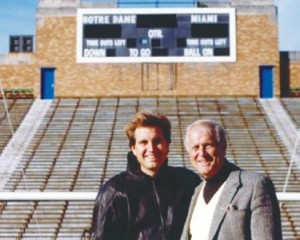
road trips
JN: Well, he recovered from that mini-stroke after a couple days in the hospital. Then we noticed during the next couple of years that, again, the ability to say names correctly and his recollection of things that happened was slipping. It became more frequent. I was living in Connecticut at the time and took him to a doctor near my home. The doctor told me, “I think your dad might have Alzheimer’s.” I refused to believe it. I decided to call Dr. Stan Appel at Houston Methodist Hospital. We’d interviewed him for a story on CBS 10 years before. He’s a remarkable man who has done so much for Alzheimer’s and the other neurodegenerative diseases. So when it came time for a second opinion, I called Dr. Appel. We booked an appointment and went in to see him. He did a series of tests with my father, and then he so gently handled that watershed moment. He called for a social worker to come in and take my mother into another room to comfort her. He pulled me aside as the man of the household to tell me, “Your dad does have Alzheimer’s. Your family faces a very long and tough battle ahead. We’re going to do the best we can to try to find answers, make your dad comfortable, and slow down the progression of the disease, but you need to be strong for your mom and sister.”
PYM: After the diagnosis, you still took your dad to a few broadcast events. How did that go?
JN: We wanted my dad to still be able to live, to try to be able to blend in with society and lead as normal a life as possible. However, having said that, we knew we needed to watch over him because there were times he could get downright silly and even embarrassing in certain situations. We did find out that the loud noises and a
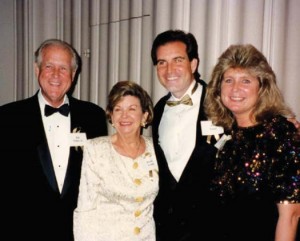
Nancy Hockaday
ll that uproar seemed to be taking a toll on him. He was hypersensitive to too much hubbub. We began to dial back on those kinds of events for him.
PYM: So once he was no longer able to attend the events, how did you maintain contact since you were traveling for work?
JN: I’ve always been a steady phone caller to my parents. I check in every day, always have, at least once a day. We tried to do everything we could to have constant communication. And I was very good about coming to Houston once a month. But I was not there on the caregiving side like my mom, my sister Nancy and my brother-in-law Don. They lived it every day. They gave so much of themselves for years to make sure Dad was looked after. They were so beautifully selfless about it. And I’ll never forget it.
PYM: In 2008, you published your bestseller Always By My Side: The Healing Gift of a Father’s Love. What made you write the book?
JN: In 2007, I was going on a 63-day stretch that included calling the Super Bowl, the Final Four, and then the Masters.
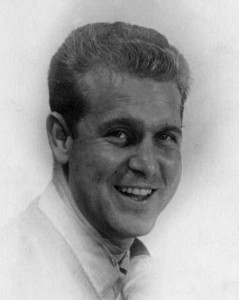
A writer for the Los Angeles Times interviewed me and wrote the article in the context that no one in the history of sports television had ever been the play-by-play voice on all three of those events in the same year. That spawned some interest from the book community that wanted a day-by-day sports book about the experiences. Even though those events are entertaining, I didn’t really think anybody would care about a detailed account of my life on the road. Then someone suggested the idea of somehow incorporating my father in the book. Now that had my interest. So it morphed into my writing about the three-championship journey and finding my father, since he wasn’t physically able to be on the trip. It became a wistful nine-week journey of a father-son trip that I only wish could have happened for real.
PYM: The book got a strong reaction and was an immediate bestseller.
JN: I could have never expected the reaction. To this day, people still approach me and say, “My mother suffers from Alzheimer’s.” “My father died of it.” I’ve become, in a way, an ambassador for the cause. The book became one of the single most important things I’ll ever do in my life because the reaction was the impetus for me to go back to Dr. Appel and tell him we needed to do something together to make a difference. That’s how we came up with the Nantz National Alzheimer Center (NNAC).
PYM: In your book, you write about how difficult it was to place your dad in an assisted care facility. Any advice to families struggling with that decision?
JN: There’s a tremendous sense of guilt that you’ll always feel. The fear of turning around, walking out that door and leaving your loved one behind, while not knowing exactly what kind of care he is getting when you’re not there. That’s something that never escapes you. You have to have faith and believe in the people you’re entrusting with your loved one. It is also really important to think about the caregiver. Long before we made the decision to move my dad, Dr. Appel had been advising me to make sure my mom was okay and received the support she needed. The concern was we didn’t want to lose my mom too.
PYM: As you mention in the book, it’s common for people to feel despondent or “lost” when a loved one is ill. Do you have any words of encouragement?
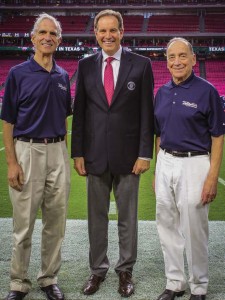
Center, Houston Methodist Neurological Institute; Jim Nantz;
Dr. Stanley Appel, chairman of neurology, Houston Methodist
Hospital; director, Houston Methodist Neurological Institute
JN: It’s so deflating it is easy to look at the world in a very bleak way. But you have to treasure each day because some day you’re going to want those days back. My dad died in 2008. In 2007 and 2006, I remember wishing I could have him back like he was in 2005, when there was some recognition in his eyes. In 2005, I remember wishing for 2003 when he could still talk a little. Back in 2003, I remember thinking back to 2000 when we were able to take walks together. What I realized is that every day you have them, there’s a reason to be grateful. I know it’s hard when you’re seeing your loved one as a fraction of the person they used to be, but they’re still here. Once my dad was gone, I just longed to still have him.
PYM: In addition to the NNAC, you also have a wine label?
JN: Yes, it’s called “The Calling,” which takes on many different meanings. One of which is I am there for the calling of the sporting events. But more than that, it’s meant to inspire people to follow their calling. That’s what I feel I’ve done with my whole life. I followed the calling of a young boy who wanted to broadcast sporting events. It is my calling to link arms with Dr. Appel and Houston Methodist to take on Alzheimer’s and neurodegenerative diseases. The wine label also gives me a platform to talk about what we’re doing in the fight against Alzheimer’s and raise money throughout the year to give back to our cause.
PYM: With the book, the NNAC and the wine label, it definitely seems you’re helping your father’s memory to live on.
JN: My father wasn’t interviewed once in his life. He was never on national television. He worked hard, provided for his family, went away to college, and moved a young family around the nation as he climbed the corporate ladder. He was an everyman, a loving man. I’ve been blessed with every little dream that I ever strove for as a kid. Now it’s time that I spend the rest of my life letting people know the real Jim Nantz, my dad. Through me, he is trying to create change to help make a difference in other people’s lives. I’m just thankful I’ve been given the strength, vision, encouragement and support to use my voice to take on this mission, with my wife, Courtney, to help generations to come.
The Nantz National Alzheimer Center
In 2011, Jim Nantz partnered with the Houston Methodist Neurological Institute to open the Nantz National Alzheimer Center (NNAC). Jim and his wife, Courtney, work tirelessly to increase funding for research and generate awareness of dementia and Alzheimer’s disease, as well as the possible effects that concussions have on these diseases. Under the leadership of Dr. Appel and Dr. Joseph Masdeu, the NNAC has become a world-renowned center with a focus on improving care and treatment for patients through the advancement of scientific research, the investigation of the causes of this debilitating disease, and provision of effective tools, guidance and support for patients’ families and caregivers.
A Human Touch
Stanley Appel, M.D., chairman of neurology and director of the Houston Methodist Neurological Institute, says the NNAC not only delivers great diagnostic care and research, it delivers hope with humanism. “Jim Nantz is one of the nicest guys in the world and that’s an approach we like to follow for our patients,” he says. Staff members are honest and direct yet also kind and supportive. The positive interaction helps build trust and hopefulness for patients and their families at a time it’s needed most.










